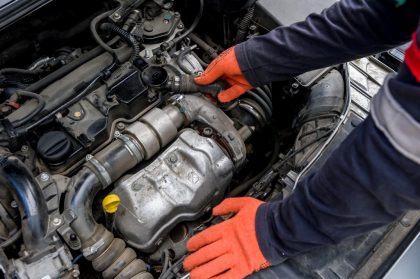
If you drive a Volkswagen, Audi, SEAT, or Skoda from around 2013 onwards, there’s a strong chance it’s powered by the EA888 Gen 3 petrol engine—specifically the 1.8 TSI or 2.0 TSI versions. These turbocharged engines are widely praised for performance and efficiency—but they’re also known for several recurring reliability issues in the UK market.
From oil consumption to timing chain wear, let’s take a look at the most common EA888 Gen 3 engine faults and what to do if your car starts showing the signs.
What Is the EA888 Gen 3 Engine?
The EA888 Gen 3 is the third generation of VW Group’s turbocharged petrol engine line-up, available in both 1.8 TSI and 2.0 TSI forms. Introduced in the UK around 2013, it was designed to reduce emissions and improve fuel economy, while still delivering punchy performance.
You’ll find the 1.8 TSI and 2.0 TSI engines across a wide range of VW Group models, including:
- Volkswagen Golf GTI / R / Passat / Tiguan
- Audi A3 / A4 / TT / Q3
- SEAT Leon FR / Cupra / Ateca
- Skoda Octavia vRS / Superb / Kodiaq
Although these engines fixed several problems seen in earlier EA888 generations, they’re still known for a few common and costly issues.
Common EA888 Gen 3 Engine Problems in the UK
Oil Consumption (1.8 TSI & 2.0 TSI)
Yes—it’s still an issue. Despite improvements, many UK drivers report notable oil loss on EA888 Gen 3 engines, particularly the 2.0 TSI. Topping up every 1,000–1,500 miles isn’t unusual, especially in higher-performance models like the Golf GTI, Cupra, and Octavia vRS.
This is often down to piston ring wear, PCV valve issues, or internal pressure problems. Left unresolved, it can lead to engine damage, turbo failure, or timing chain wear due to low oil levels.
PCV Valve Failure
Another frequent issue in both 1.8 TSI and 2.0 TSI engines. The PCV system is designed to manage crankcase pressure—but when the valve fails, symptoms can include rough idle, oil leaks, boost issues, and increased oil consumption.
Timing Chain Tensioner Wear
Although Gen 3 introduced an improved chain system, some engines still suffer from cold start rattle or timing chain stretch, especially if oil levels have been low. In the worst cases, this can lead to the chain jumping a tooth or breaking, causing serious engine damage. A new engine is normally the only fix once if the chain breaks.
Coolant Leaks from Thermostat Housing / Water Pump
Plastic components like the thermostat housing and water pump are known weak points. They can develop slow leaks that lead to coolant loss and eventual overheating, especially in long-commute UK cars.
Turbo Wastegate Rattle / Failure
The turbocharger on these engines can develop actuator rattle or fail to hold boost pressure. This is especially common on remapped 2.0 TSI engines, but also affects standard cars. Replacement costs can run well into the four figures.
Carbon Build-Up (Direct Injection)
Because both the 1.8 TSI and 2.0 TSI are direct injection engines, carbon deposits build up on the intake valves over time. This results in rough running, loss of performance, and emissions warning lights—especially on cars used for short trips.
Which UK Cars Use the EA888 Gen 3 1.8 TSI & 2.0 TSI Engines?
The EA888 Gen 3 engine family is widespread across VW Group’s UK line-up, powering many petrol models from 2013 to 2020, including:
- Volkswagen Golf GTI / R / Passat / Tiguan
- Audi A3 / A4 / A5/ TT / Q3
- SEAT Leon FR / Cupra / Ateca
- Skoda Octavia vRS / Superb / Karoq / Kodiaq
Why Do These Engines Still Go Wrong?
Despite being more refined than earlier generations, the EA888 Gen 3 engines still struggle with:
- Oil control issues linked to piston rings and PCV systems
- Timing chain tensioners that weaken over time
- Plastic coolant components prone to fatigue
- Turbo actuator wear, especially under high boost
- Carbon build-up due to direct injection
Get in Touch with Us for:
- Free, no-obligation quote (valid for 28 days)
- Free collection, whether from your home, garage or dealership
- Payment before collection
- No inspections, appointments, or stress
- Excellent Customer Service
